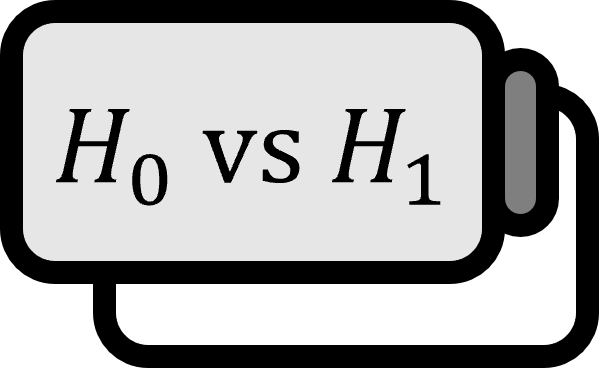Friedman Fr Test
Hypothesis testing 1 2
On the experimental design, suppose there are $k$ treatments and $b$ blocks, yielding $n = bk$ samples. The samples from the $j = 1 , \cdots , k$th treatment are each independent and randomly sampled from the same location family, and assume the population median of the $j$th population is $\theta_{j}$. The following hypothesis test for $\theta_{1} , \cdots , \theta_{k}$ is called the Friedman $F_{r}$ test.
- $H_{0}$: $\theta_{1} = \cdots = \theta_{k}$
- $H_{1}$: At least one $\theta_{j}$ differs from the other medians.
Test statistic
The test statistic for the rank-sum $R_{j}$ of the sample obtained from the $j$th population is given by: $$ F_{r} = {\frac{ 12 }{ bk \left( k + 1 \right) }} \sum_{j=1}^{k} R_{j}^{2} - 3 b \left( k + 1 \right) $$ This test statistic approximately follows a chi-squared distribution $\chi^{2} \left( k - 1 \right)$ with degrees of freedom $k-1$ when either $b$ or $k$ is larger than $5$.
Explanation
The Friedman test is a nonparametric method corresponding to two-way ANOVA among parametric techniques, and is analogous to the relationship between the Kruskal–Wallis test (which corresponds to one-way ANOVA) and its parametric counterpart. For significance level alpha $\alpha$, compare with the lower bound $\chi^{2}_{1-\alpha} (k-1)$ of the rejection region; if $H > \chi^{2}_{1-\alpha} (k-1)$, then reject the null hypothesis and conclude that at least one population differs from the others.
Just as understanding one-way ANOVA helps to understand two-way ANOVA, to understand the derivation of this peculiar statistic $F_{r}$ it is sufficient to study the theoretical background of the Kruskal–Wallis $H$ test (see Kruskal–Wallis $H$ test).
See also
| Experimental design | Parametric methods | Nonparametric methods |
|---|---|---|
| Completely randomized design | One-way ANOVA | Kruskal–Wallis $H$ test |
| Randomized block design | Two-way ANOVA | Friedman $F_{r}$ test |
Mendenhall. (2012). Introduction to Probability and Statistics (13th Edition): p656. ↩︎
Pereira, D. G., Afonso, A., & Medeiros, F. M. (2015). Overview of Friedman’s Test and Post-hoc Analysis. Communications in Statistics - Simulation and Computation, 44(10), 2636–2653. https://doi.org/10.1080/03610918.2014.931971 ↩︎
